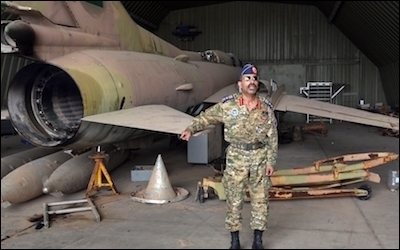by Seth Frantzman, The Spectator,

A Government of National Accord (GNA) military spokesman shows off a newly seized airbase southwest of Tripoli on May 18, 2020. (AFP)
Libya has been in the midst of civil war for almost a decade. However, in the last year, the conflict has escalated and become a regional proxy war. This matters because Libya is a gateway for migrants coming to Europe and because whoever wins in Libya will emerge a powerful figure in the Middle East. Eastern Libya is run by Khalifa Haftar and his Libyan National Army (LNA). He is principally backed by the UAE, Egypt and Russia; and he appears to receive support from France, Saudi Arabia and Greece. The government in Tripoli is backed by Turkey and Qatar. Haftar seemed poised to take Tripoli in recent months but his allies in Abu Dhabi, Cairo and Moscow have suffered setbacks. They have not been able to get Haftar over the line.
Libya is the Middle East’s most important proxy conflict today. Just read the differing pro-government media accounts from voices across the region, like those in the UAE and in Turkey that illustrate just how important Libya has become. Turkey calls Haftar a ‘warlord’ while The National in the UAE accuses Tripoli of arming ‘militias’ while playing up accounts of the Muslim Brotherhood controlling the Libyian capital.
On 18 May, Government of National Accord (GNA) forces in Tripoli captured a strategic airbase from Haftar. They destroyed several Russian-made Pantsir air defence systems, according to satellite images and local accounts. Turkish Bayraktar drones are now competing with Chinese-made Wing Loong drones, supplied to Haftar’s forces, for control of the skies of Libya. The country is a testbed for drone and air defence technology.
While the world has been focused on conflicts in Yemen and Syria, Libya is where some of the most powerful countries in the Middle East are increasingly involved. With the pandemic shifting the international community’s focus inward, the conflict in Libya is escalating and this has ramifications because Libya is a conduit for migrants heading to Europe and it may also shift the balance of power between Russia, Turkey, Greece and the Gulf states.
Turkey entered Libya in November 2019. It signed a deal with Tripoli that gives Turkey a swath of claims over the Mediterranean and in response Ankara promised to send military aid. Drones and armoured vehicles poured in from Ankara. Ankara also hired thousands of poor Syrian rebels to go fight in Libya. This was classic cynicism from Turkey: Use Syrians to fight on foreign battlefields, test armed drones, get energy deals, humiliate Egypt and the UAE, pressure Russia and frustrate Greece. For Turkey, it was a win-win-win-win situation. All Turkey had to do was prevent the GNA in Tripoli from losing.
For Egypt, Russia, and the UAE, the conflict in Libya is more complex. The UAE and Saudi Arabia have already engaged in a conflict in Yemen against Iranian-backed Houthis. They have been fought to a standstill there. In addition, they have watched as Turkey and Iran have increased their role in Syria in recent years. To reclaim their historic influence, the Gulf states and Egypt sought to try to end the Libyan conflict. However, they were frustrated in attempts to get Haftar into Tripoli. Haftar was more successful years ago taking Benghazi from extremists and conquering oil fields. But Tripoli proved a bridge too far.
| Libya is an example of what happens when Western governments walk away from a conflict. |
The Libyan conflict is an example of what happens when Western governments walk away from a conflict. Libya was a simmering civil war for years. An American ambassador was murdered in 2012 while the Islamic State briefly managed to secure a foothold. As a transit point for African migrants, Europe has been concerned about Libya primarily in terms of how to prevent unchecked migration. Now larger questions loom.
The export of drone technology and the implications of gas drilling deals off the coast have ramifications. Israel wants to build a pipeline with Greece to Europe but this appears to intersect with the Turkish sea-grab off Libya. A ceasefire in Tripoli and discussions between all sides could tie together several regional conflicts at once. But none of the countries involved seem to want to talk. With Washington increasingly unwilling to play a leadership role in places like Libya, and a global pandemic distracting other countries, the results are a growing proxy conflict. Libya looks symbolic to the future of international affairs, with proxy wars, armed drones and regional powers pushing forward when Western countries step aside.
Seth Frantzman, a Middle East Forum writing fellow, is the author of After ISIS: America, Iran and the Struggle for the Middle East (2019), op-ed editor of The Jerusalem Post, and founder of the Middle East Center for Reporting & Analysis.



HRC-Sarko & BHL were major players in this mess that eventually led to the creation of a bridge to Italy for “migrants! Then Fr. & Germany dumbed Italy.
La “DESUNION fait la Force”!
Le Quai d’Orsay is deeply involved in trying to “capture” Libya! A piece of the French EurAbia puzzle project!